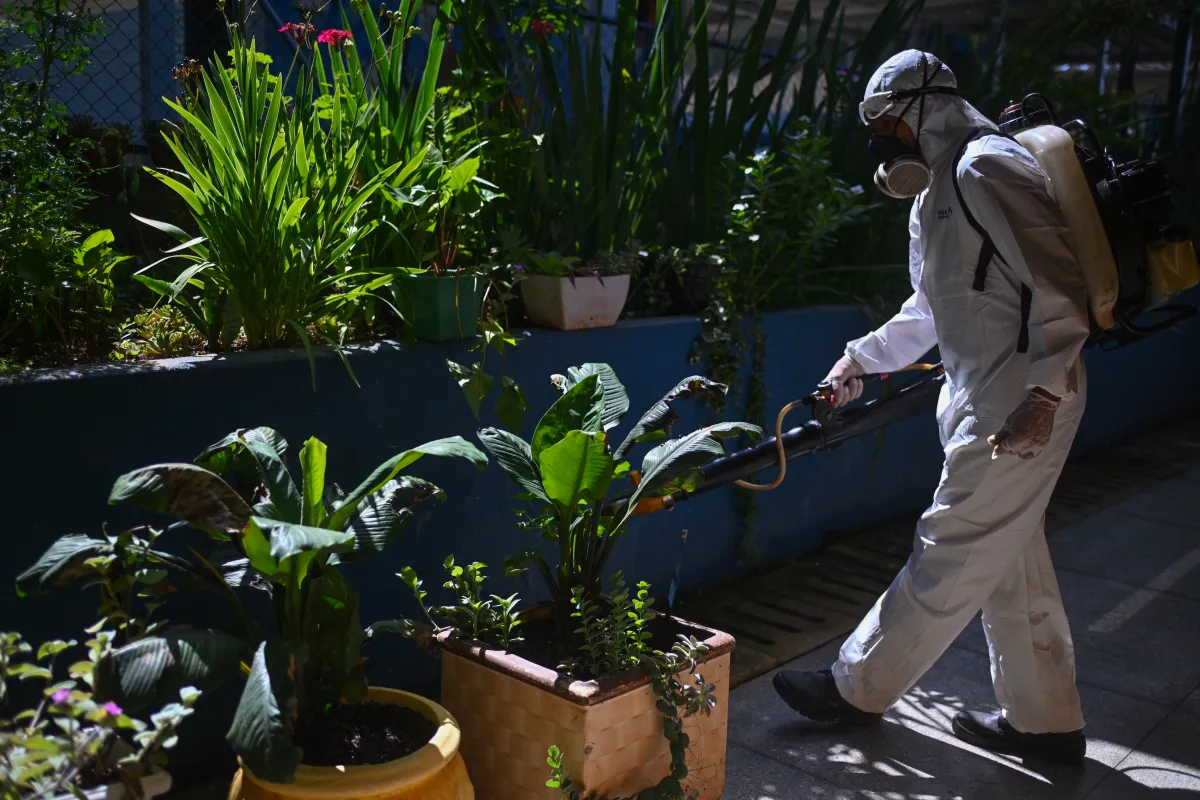International
Dengue epidemic in Latin America reaches alarming figures in the first quarter of 2024

The dengue epidemic in South America has reached alarming figures so far in 2024, with a notable increase in cases and deaths compared to the previous year, especially in Brazil, a country that has surpassed its own annual historical record of dengue infections, to date more than two million cases and 715 deaths.
The situation is especially worrying in Brasilia, with 5,774 cases per 100,000 inhabitants.
Authorities estimate that the number could amount to 4.2 million by the end of the year and have begun to offer vaccination despite the shortage of doses.
In Argentina, the Ministry of Health reported 151,310 cases of dengue, 134,202 of them registered this year, with an incidence of 321 cases per 100,000 inhabitants and 106 deaths, 96 of which occurred in 2024.
In addition, nineteen of the 24 territorial divisions have reported the presence of the virus, removing only Patagonian regions due to unfavorable weather conditions for mosquitoes.
The Government of Javier Milei has opted for strategies that do not include mass vaccination, saying that there is a lack of evidence about the effectiveness of vaccines in current outbreaks.
For its part, Uruguay reached 158 cases of dengue on Monday (62 native and 96 imported) after adding 10 new cases in the last 24 hours, the Ministry of Public Health said in its daily report, in which it indicated that the majority of imports are from people who traveled to Argentina and Brazil.
On the other hand, Paraguay also reports worrying figures.
Since September 2023, the beginning of the most recent outbreak, until the second week of March 2024, the country has suffered 74 deaths due to dengue, the Ministry of Public Health and Social Welfare reported.
Data from the General Directorate of Health Surveillance indicate that 35% of the deceased were over 60 years of age.
Peru is also experiencing an increase with 79,741 cases reported so far in 2024, an increase of 262% compared to the same period of the previous year.
82 deaths have been reported, a considerable jump from the 29th of the corresponding period in 2023.
The incidence of the disease is 233.77 per 100,000 inhabitants, with La Libertad being the most affected region.
In Colombia, the National Institute of Health has registered 55,340 cases, with 40.2% showing signs of alarm and 1% of serious cases. As of March 3, 94 probable deaths have been reported, with 10 confirmed cases and 69 under study.
The incidence of dengue at the end of February 2024 was 154.8 cases per 100,000 inhabitants at risk, in stark contrast to the 48.8 cases per 100,000 inhabitants reported in the same period of the previous year.
As so last in 2023, the Pan American Health Organization (PAHO) warned of the increase in dengue cases in the Americas. Last year the figure was 4.5 million cases.
Dengue, whose main vector of transmission in almost the entire American continent is the Aedes aegypti mosquito, affects people of all ages, and according to the World Health Organization, behind the expansion of the epidemic is the climate phenomenon of El Niño, as evidenced by the fact that it is growing in all parts of the world, except in Europe, according to the director general of the WHO, Tedros Adhanom.
The increase in dengue cases in Latin America, according to experts, is also due to the need for more effective preventive and control actions, as well as constant epidemiological surveillance to combat the progression of the disease.
International
Rubio rules out 2028 presidential bid if Vance runs

U.S. Secretary of State Marco Rubio said he would not seek the presidency in 2028 if current Vice President JD Vancedecides to run as the Republican nominee to succeed President Donald Trump.
“If JD Vance runs for president, he will be our candidate, and I will be one of the first people to support him,” Rubio said in an interview with Vanity Fair, in which he appeared alongside other senior members of the presidential cabinet.
Rubio, 54, and Vance, 41, are widely viewed as two of the leading Republican figures who could headline the party’s ticket in the 2028 election. Under the U.S. Constitution, Trump is barred from seeking another term after completing two presidential mandates.
In a lighthearted moment during the interview, Vance jokingly offered photographers $1,000 if they managed to make him look better than Rubio in the photos. Both leaders have received public backing from Trump, who last October floated the idea of a joint ticket featuring Rubio and Vance, without clarifying who would lead it.
“I think that if they ever teamed up, they would be unstoppable. I don’t think anyone would run against us,” Trump said at the time.
White House Chief of Staff Susie Wiles, who also took part in the interview, confirmed that Trump does not intend to violate the 22nd Amendment, which prohibits a third presidential term, though she acknowledged that the president is “having fun” with speculation about a possible return to office.
Rubio, the son of Cuban immigrants, served as a Republican senator from 2010 to 2025. He sought the party’s presidential nomination in 2016 but was defeated by Trump after a bruising primary contest. His name was floated as a potential vice presidential pick in 2024, but Vance ultimately secured the spot. After taking office, Trump appointed Rubio as secretary of state, making him the first Latino to hold the position.
International
Authorities search for armed and dangerous suspect in fatal Brown University attack

According to the statement, investigators are “seeking the public’s help to identify and speak with an individual” who was seen “near” the suspect at the time of the attack.
The Providence Police Department in Rhode Island released three photos of the person of interest, whose face has been blurred. In the images, the individual is wearing navy blue clothing, what appears to be a green hood, and carrying a light-colored backpack.
Earlier, authorities had released several photos and videos of a suspect described as “approximately 5 feet 8 inches tall, with a stocky build,” dressed in dark clothing, with their face covered by a surgical mask and wearing a beanie. The suspect’s identity remains unknown.
Authorities are offering a $50,000 reward for any information leading to the identification, arrest, and conviction of the person responsible for the killings, who is considered armed and dangerous.
The gunman opened fire on Saturday at Brown University’s engineering and physics building, where exams were being held, killing students Ella Cook and Mukhammad Aziz Umurzokov. The names of the nine people injured have not been released.
International
Police investigate deaths of Rob Reiner and wife as apparent homicide

The Los Angeles Police Department (LAPD) is investigating the deaths of Hollywood actor and filmmaker Rob Reinerand his wife as an “apparent homicide,” amid a wave of tributes to the director of classics such as When Harry Met Sally.
According to U.S. media reports on Sunday, Rob Reiner and Michele Singer Reiner were found dead at their Los Angeles mansion with what appeared to be stab wounds.
Several political figures shared messages of condolence following the reported deaths of the director of A Few Good Menand his wife.
While the LAPD did not officially confirm the identities of the victims, it stated that homicide detectives were dispatched to the Reiner residence.
“At this time, no additional details are available and the investigation into an apparent homicide is ongoing,” the Los Angeles Police Department said in a statement posted on social media.
LAPD Deputy Chief Alan Hamilton told reporters that no arrests have been made and that no individuals are currently being questioned as suspects.
“I’m not going to confirm whether anyone is being questioned at this moment or not. We are going to try to speak with as many family members as we can,” Hamilton said.
CNN reported that a family spokesperson confirmed the deaths of Reiner and his wife.
California Governor Gavin Newsom, former U.S. President Barack Obama, and former Vice President Kamala Harrisissued statements expressing their condolences.
-

 Central America3 days ago
Central America3 days agoPanama seizes over three tons of drugs hidden in Caribbean port container
-

 International3 days ago
International3 days agoPolice investigate deaths of Rob Reiner and wife as apparent homicide
-

 International4 days ago
International4 days agoSeveral people shot in attack on Brown University campus
-

 Central America3 days ago
Central America3 days agoOAS urges swift recount in Honduras as election results remain uncertain
-

 Central America1 day ago
Central America1 day agoBukele says AI partnership with xAI will transform public education in El Salvador
-

 Central America1 day ago
Central America1 day agoEl Salvador ranks among top countries in the Americas in fight against organized crime
-

 International4 days ago
International4 days agoU.S. and Mexico Reach Deal to Address Water Deficit Under 1944 Treaty
-

 International7 hours ago
International7 hours agoRubio rules out 2028 presidential bid if Vance runs
-

 Central America7 hours ago
Central America7 hours agoArrests and clashes in Tegucigalpa as vote count continues after Honduras election
-

 International7 hours ago
International7 hours agoAuthorities search for armed and dangerous suspect in fatal Brown University attack




























